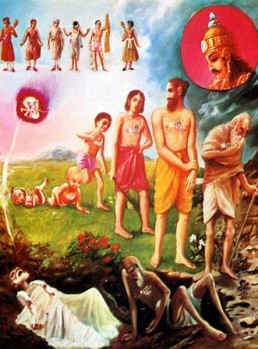Swami Chinmayananda Commentary
The subtle Reality in each body, the indwelling Spirit in every creature is Eternal and Indestructible. All that is destroyed is only the container, the finite matter envelopment. Therefore, Arjuna has been advised that he should not grieve at facing his enemies and in the great battle, even killing them, if need be. To bring out this idea, the entire earlier section has been used by Krishna wherein he argued so well to establish the Eternal nature of the soul and the finite nature of the bodies. Shankara rightly concludes that this stanza winds up the entire section opened in verse 11.
HERE IN THIS VERSE, IT HAS BEEN SHOWN THAT FROM THE STANDPOINT OF ABSOLUTE TRUTH, THERE IS NO OCCASION FOR GRIEF AND ATTACHMENT. NOT ONLY FROM THE STANDPOINT OF ABSOLUTE TRUTH, BUT ALSO:
Adi Sankara Commentary
Because of being partless and eternal, ayam, this dehi, embodied Self; nityam avadhyah, can never be killed, under any condition. That being so, although existing sarvasya dehe, in all bodies, in trees etc., this One cannot be killed on account of Its being allpervasive. Since the indewelling One cannot be killed although the body of everyone of the living beings be killed, tasmat, therefore; tvam, you; na arhasi, ought not; socitum, to grieve; for sarvani bhutani, all (these) beings, for Bhisma and others. Here [i.e. in the earlier verse.] it has been said that, from the standpoint of the supreme Reality, there is no occasion for sorrow or delusion. (This is so) not merely from the standpoint of the supreme Reality, but —
The Bhagavad Gita with the commentary of Sri Sankaracharya – Translated by Alladi Mahadeva Sastry
Holy Geeta – Commentary by Swami Chinmayananda
The Bhagavad Gita by Eknath Easwaran – Best selling translation of the Bhagavad Gita
The Bhagavad Gita – Translation and Commentary by Swami Sivananda
Bhagavad Gita – Translation and Commentary by Bhaktivedanta Swami Prabupadha
Srimad Bhagavad Gita Chapter 2 – Verse 30 – 2.30 dehi nityam – All Bhagavad Gita (Geeta) Verses in Sanskrit, English, Transliteration, Word Meaning, Translation, Audio, Shankara Bhashya, Adi Sankaracharya Commentary and Links to Videos by Swami Chinmayananda and others – 2-30

